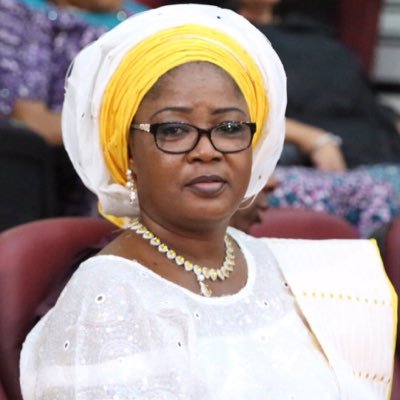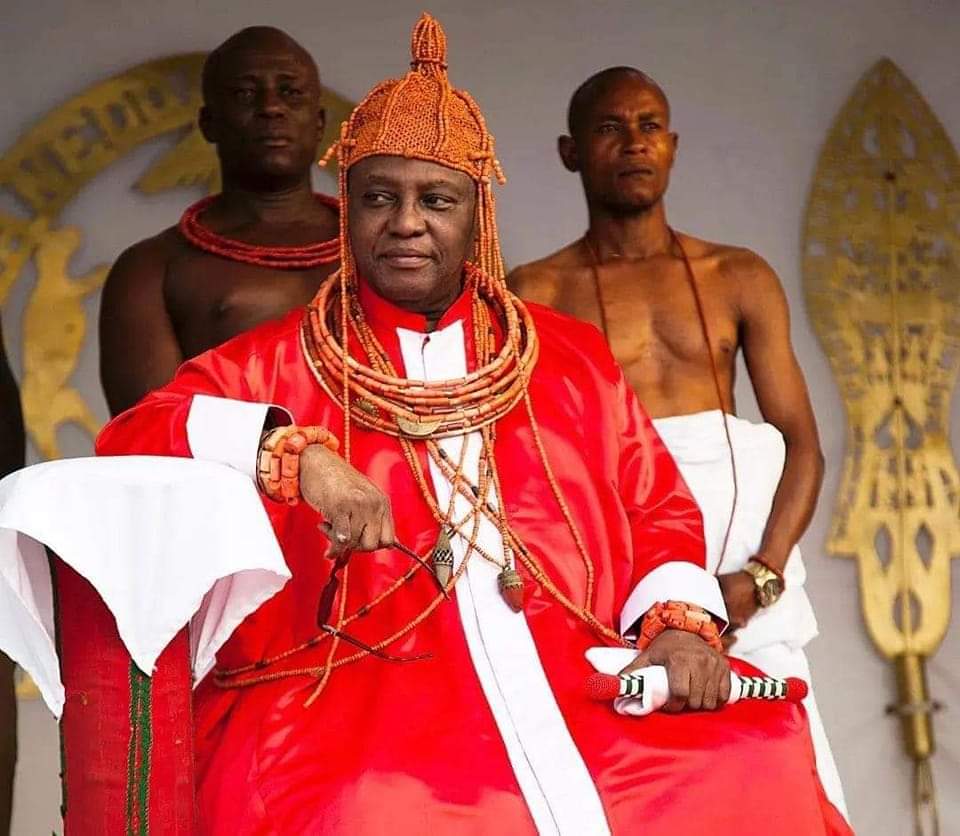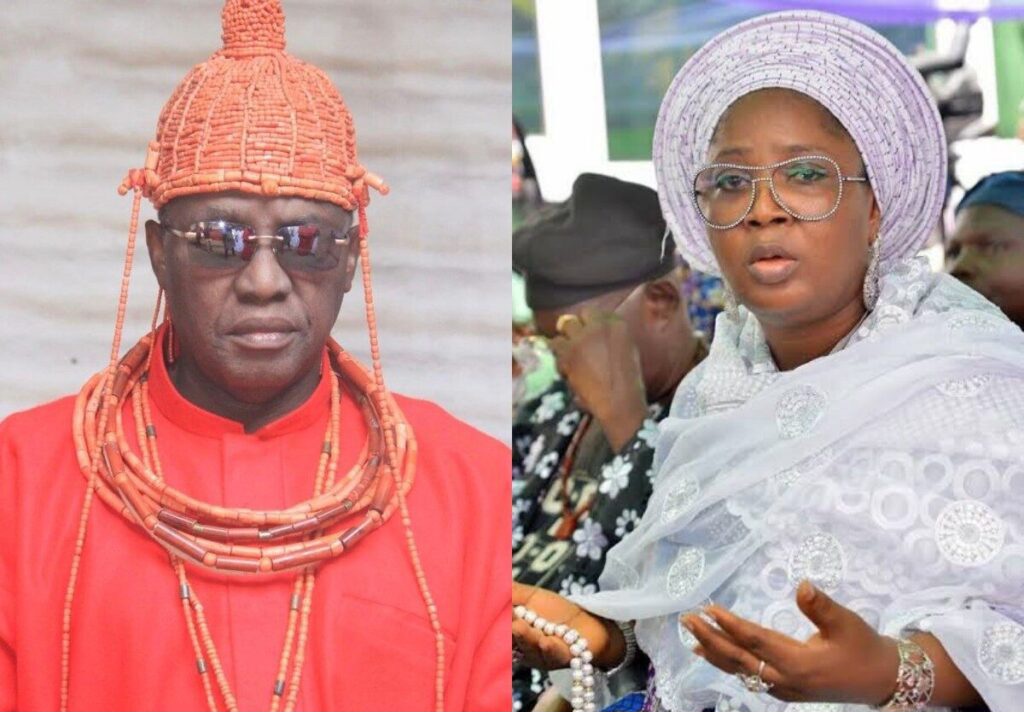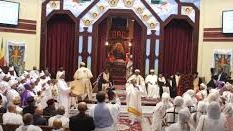Edo ‘Iyaloja’ Clash: Culture or Politics?

In Benin City, the heart of Edo State, the air has been thick with debate, a debate that cuts deep into the soul of tradition, identity, and power. This is as a result of the recent attempt to introduce the Iyaloja title into the Benin market system has stirred a controversy that is as cultural as well as political.
What began as a ceremonial announcement has evolved into a national conversation about cultural sovereignty, political overreach, and the fragile balance between modernization and heritage.

The Spark That Lit the Fire
The storm began when Mrs. Folashade Tinubu-Ojo, the Iyaloja-General of Nigeria and daughter of President Bola Ahmed Tinubu sought to install Pastor Josephine Ivbazebule as Iyaloja-General of Edo State. To many, it looked like another ceremonial position, a harmless recognition of women in trade, but in the Benin Kingdom, where culture is not just tradition but governance, this move struck a deep cultural nerve.
The Oba of Benin, His Royal Majesty Omo N’Oba N’Edo Uku Akpolokpolo, Ewuare II , swiftly rejected the idea. His statement was firm as he made it known that
“The Iyaloja title is alien to Benin culture. We have our own market leadership structure, known as Iyeki(in Bini Language) meaning ‘Mother of the Market’. There is no place for an Iyaloja-General in Benin markets.”
With that declaration, a cultural boundary was drawn, and the conversation quickly spilled beyond the markets into the national space.

Understanding the Benin Market System
To understand the tension, one must appreciate the cultural fabric of Benin’s market tradition.
Every market in the Benin Kingdom has a woman leader called the ‘Iyeki’, this concept was explained by Amienye Omorogie, Former SSA to the Governor of Edo State on Arts, Culture and Tourism on a live interview with News Central. This title is not just administrative, for the Benin, it is also spiritual. The Iyeki oversees market harmony, enforces the Oba’s market rules, and plays a role in certain rituals tied to fertility, commerce, and peace. Appointments are made locally, that is the market women nominate one of their own, and the Oba’s palace confirms her selection. There is no concept of a “statewide” Iyeki or an umbrella leader. Each market answers to the Oba’s spiritual authority, not a political appointee.
Introducing an Iyaloja-General structure, as seen in parts of the Yoruba Southwest, challenges this decentralized and culturally specific model. To many Benin elders, it is akin to renaming the Oba’s palace a “traditional council office” which is technically harmless, but symbolically dangerous.

Culture Meets Politics
However, this issue is not just about tradition, it is about timing, symbolism, and influence. The Iyaloja-General of Nigeria, Mrs. Tinubu-Ojo, has been a prominent figure since her father’s rise to national power. Her visits to various states have often carried undertones of political coordination, even if framed as advocacy for market women.
Critics argue that the attempt to install an Iyaloja in Edo was a subtle political maneuver, a way to extend influence into Edo’s grassroots markets, which have historically played a major role in election mobilization.
A civic rights group, CHRICED (Resource Centre for Human Rights and Civic Education), praised the Oba’s response as “a necessary resistance against the creeping politicization of traditional structures.”
“When culture becomes a tool for political positioning,” the group’s statement read, “the people lose both their heritage and their autonomy.”
In the midst of this, others see it differently. Supporters of the Iyaloja-General initiative insist that it is about “empowering women traders nationwide under one voice.” To them, cultural variation should not prevent progress or unity among Nigerian market women, but therein lies the tension, where does empowerment end and where does encroachment begin?

The Power of Names and Titles
Titles in Benin are not just ceremonial; they carry ancestral weight. A title out of place is not just wrong, it is inauspicious. Benin historians remind us that during the reign of Oba Eweka I, even trade routes were governed by spiritual codes. Markets were seen as living entities, and their leadership linked to deities such as Ovia and Olokun.
The term “Iyaloja” is from the Yoruba Culture. To introduce a new title, especially one borrowed from another culture, without ritual adaptation or royal consent is viewed as sacrilege. Culture is not an accessory to politics, it is a living system. Once you change the title, you change the power dynamic, and to the Edo people, that is what the palace is protecting.
Edo’s Political Landscape and the Timing
The timing of this controversy is also significant. Edo State is gearing up for another round of political transitions, with tensions already brewing among parties. The involvement of a national political figure in market leadership appointments raises suspicions that go beyond gender or empowerment. The markets of Edo are political strongholds. Historically, they have been centers of mobilization, where traders, artisans, and market women shape political opinions. So, while the Iyaloja-General title might sound harmless on the surface, its introduction during an election-sensitive period carries undertones of strategy.
A Clash of Worlds
What we are witnessing, is a clash of two worlds. The world of cultural sovereignty, where the Oba of Benin remains the supreme custodian of tradition, and the world of modern political centralization, where titles and national structures often blur cultural boundaries in the name of unity or visibility. Neither side is entirely wrong, but the collision exposes a recurring Nigerian dilemma, which is the struggle to balance traditional autonomy with political ambition.
The Voices That Matter
Lost in much of the debate are the market women themselves, the true custodians of the markets. Some traders interviewed in New Benin Market expressed loyalty to the Oba, insisting that “the palace knows best.” Others said they simply want peace, lower taxes, and better infrastructure, not title wars.
“Let them settle it themselves,” said Mrs. Igbinovia, a pepper seller. “Iyeki, Iyaloja, na we dey sell for sun. Just fix road make we fit come market.”
Her words, though simple, reveal a truth politicians and traditionalists often miss: for the ordinary market woman, survival comes before titles.
Culture or Politics? Possibly Both
It would be naive to claim this issue is purely cultural, just as it would be unfair to say it is entirely political. It is both woven together in a uniquely Nigerian tapestry where power, identity, and tradition constantly intersect.
The Oba’s stance reinforces a crucial lesson, which iterates that every culture must guard its roots before embracing external branches, but the modern political context reminds us that national integration and women’s leadership also deserve space in the public conversation.

The question is how to pursue both without eroding one.
The Iyaloja debate in Edo State is not just a clash over a title. It is a reflection of Nigeria’s deeper identity struggle, how to remain authentically diverse in an increasingly centralized nation. When politics speaks the language of culture, caution must follow. For while power may change hands every election cycle, tradition, if protected endures through centuries.
In the end, whether the issue is culture or politics depends on where one stands, but to many in Benin, the answer is clear - Culture came before politics, and must never bow to it.
What do you think?
You may also like...
When Sacred Calendars Align: What a Rare Religious Overlap Can Teach Us

As Lent, Ramadan, and the Lunar calendar converge in February 2026, this short piece explores religious tolerance, commu...
Arsenal Under Fire: Arteta Defiantly Rejects 'Bottlers' Label Amid Title Race Nerves!

Mikel Arteta vehemently denies accusations of Arsenal being "bottlers" following a stumble against Wolves, which handed ...
Sensational Transfer Buzz: Casemiro Linked with Messi or Ronaldo Reunion Post-Man Utd Exit!

The latest transfer window sees major shifts as Manchester United's Casemiro draws interest from Inter Miami and Al Nass...
WBD Deal Heats Up: Netflix Co-CEO Fights for Takeover Amid DOJ Approval Claims!

Netflix co-CEO Ted Sarandos is vigorously advocating for the company's $83 billion acquisition of Warner Bros. Discovery...
KPop Demon Hunters' Stars and Songwriters Celebrate Lunar New Year Success!

Brooks Brothers and Gold House celebrated Lunar New Year with a celebrity-filled dinner in Beverly Hills, featuring rema...
Life-Saving Breakthrough: New US-Backed HIV Injection to Reach Thousands in Zimbabwe

The United States is backing a new twice-yearly HIV prevention injection, lenacapavir (LEN), for 271,000 people in Zimba...
OpenAI's Moral Crossroads: Nearly Tipped Off Police About School Shooter Threat Months Ago
ChatGPT-maker OpenAI disclosed it had identified Jesse Van Rootselaar's account for violent activities last year, prior ...
MTN Nigeria's Market Soars: Stock Hits Record High Post $6.2B Deal

MTN Nigeria's shares surged to a record high following MTN Group's $6.2 billion acquisition of IHS Towers. This strategi...






